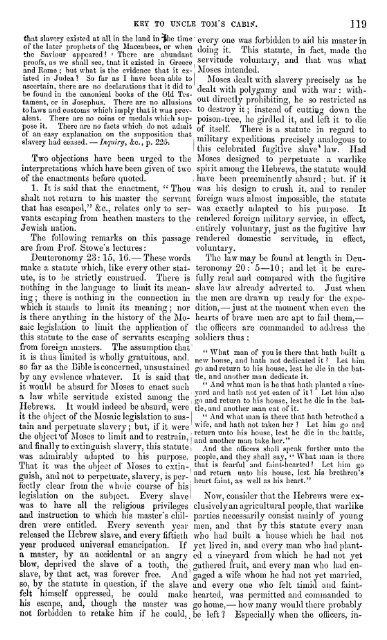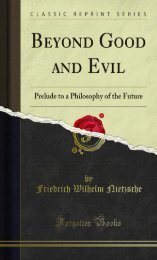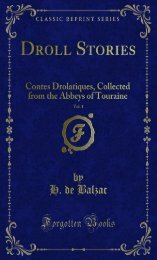UNCLE TOM'S CABIN
1iw97FV
1iw97FV
- No tags were found...
Create successful ePaper yourself
Turn your PDF publications into a flip-book with our unique Google optimized e-Paper software.
Inquiry,"c,<br />
"<br />
-just<br />
-10<br />
that slavery existed at all in the land in^hetime<br />
of the later prophetsof tliQMaccabees,or when<br />
the Saviour i<br />
appeared? There are abundant<br />
proofs, as we shall see, tnat it existed in Greece<br />
and Rome ; but what is the evidence that it existed<br />
in Judea 1 So far as I have been able to<br />
ascertaințhere are no declarations that it did to<br />
be found in the canonical books of the Old Testament,<br />
There are no allusions<br />
or in Josephus.<br />
to laws and customs which imply that itwas prevalent.<br />
There are no coins or medals which suppose<br />
it. There are no facts which do not admit<br />
of an<br />
easy explanation<br />
the supposition that<br />
had ceased. p. 226*.<br />
slavery<br />
"<br />
Two objections have been urgedto the<br />
interpretations which have been givenof two<br />
of the enactments before quoted.<br />
1. It is said that the enactment, " Thou<br />
shaltnot return to his master the servant<br />
that has escaped," "c, relatesonlyto servants<br />
escaping from heathen masters to the<br />
Jewish nation.<br />
The following remarks on this passage<br />
are from Prof. Stowe's lectures:<br />
These words<br />
KEY TO <strong>UNCLE</strong> TOM S CABltf. 119<br />
Deuteronomy23: 15, 16.<br />
"<br />
make a statute which,like every other statute,<br />
is to be strictly construed. There is read and comparedwith the fugitive<br />
nothingin the language to limit itsmeaning<br />
slave law alreadyadverted to. Just when<br />
; there is nothing the connection in the men are drawn up ready for the expedition,<br />
which it stands to limit its meaning; nor<br />
at the moment when even the<br />
is there anything in the history of the Mosaic<br />
heartsof brave men are apt to fail them,"<br />
legislation to limit the application of the officers are commanded to address the<br />
thisstatute to the case of servants escaping soldiersthus :<br />
from foreign masters. The assumption that<br />
it is thus limited is whollygratuitous, and.<br />
so far as the Bible isconcerned, unsustained<br />
by any evidence whatever. It is said that<br />
itwould be absurd for Moses to enact such<br />
a law while servitude existed among the<br />
Hebrews. It would indeed be absurd, were<br />
it the object of the Mosaic legislation to sustain<br />
and perpetuateslavery ; but,if it were<br />
the object<br />
and finally to extinguish slavery,<br />
'ofMoses to limit and to return unto his house,lest he die in the battle,<br />
restrain,<br />
this statute<br />
was admirablyadaptedto his purpose.<br />
That it was the objectof Moses to extinguish,<br />
and not to perpetuateșlavery, is perfectly<br />
heart faint,as well as his heart."<br />
clear from the whole course of his<br />
legislation<br />
the subject.Every slave Now, considerthat the Hebrews were exclusively<br />
was to have all the religious privileges<br />
an agricultural people, that warlike<br />
and instruction to which his master's children<br />
parties necessarily consist mainly of young<br />
were entitled. Every seventh year men, and that by this statute every man<br />
releasedthe Hebrew slave, and every fiftieth who had built a house which he had not<br />
year produceduniversalemancipation. If yet lived in, and every man who had planted<br />
a master, by an accidental or an angry a vineyard from which he had not yet<br />
blow,deprivedthe slave of a toothțhe gathered fruit,and every<br />
man who had engaged<br />
slave,by that act,Avas forever free. And<br />
a wife whom he had not yet married,<br />
if the slave and every one who felttimid and fainthearted,<br />
so, by the statute in question,<br />
felt himself oppressed,he could make<br />
his escape, and, though the master was<br />
not forbidden to retake him if he could,<br />
every<br />
one was forbidden to aid his master in<br />
doing it. This statute, in fact,made the<br />
servitude voluntary, and that was what<br />
Moses<br />
intended.<br />
Moses dealt with slaveryprecisely as<br />
he<br />
dealtwith polygamyand with war : without<br />
directly prohibiting, he so restricted as<br />
to destroy it ; instead of cutting down the<br />
he girdledit,and leftit to die<br />
poison-tree,<br />
of itself.There is a statute in regardto<br />
military expeditions precisely analogous to<br />
this celebrated fugitiveslave*law. Had<br />
Moses designed to perpetuate a warlike<br />
spirit among the Hebrewsțhe statute would<br />
have been preeminently absurd ; but. if it<br />
was his designto crush it,and to render<br />
foreign wars almost impossible, the statute<br />
was exactlyadaptedto his purpose. It<br />
rendered foreignmilitary service, in effect,<br />
entirely voluntary, just as the fugitive law<br />
rendered domestic servitude, in effect,<br />
voluntary.<br />
The law may be found at lengthin Deuteronomy<br />
20 : 5<br />
"<br />
; and let it be carefully<br />
"<br />
What man of you is there that hath built a<br />
new house,and hath not dedicated it 1 Let him<br />
go and return to his house, lest he die in the battle,<br />
and another man dedicate it.<br />
"<br />
And what man is he that hath planted a vineyard<br />
and hath not yeteaten of it1 Let him also<br />
go and return to his house,lest he die in the battle,<br />
and another man eat of it.<br />
"<br />
And what man is there that hath betrothed a<br />
wife,and hath not taken her ? Let him<br />
go and<br />
and another man take her."<br />
And the officers shall speak<br />
further unto the<br />
"<br />
people,and theyshall say, What man is there<br />
that is fearful and faint-hearted? Let him<br />
go<br />
and return unto his house, lest his brethren's<br />
was permitted and commanded to<br />
home,"<br />
go how many would there probably<br />
be left1 Especially when the officers, in-




